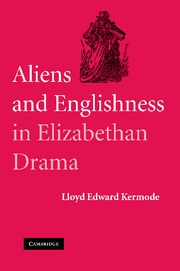Book contents
- Frontmatter
- Contents
- Preface
- Acknowledgements
- 1 Introduction – aliens and the English in London
- 2 Discovering the alien in Elizabethan moral drama
- 3 Accommodating the alien in mid-Elizabethan London plays
- 4 Incorporating the alien in Shakespeare's second tetralogy
- 5 Being the alien in late-Elizabethan London plays
- Postscript: Early modern and post-modern alien excursions
- Notes
- Bibliography
- Index
Postscript: Early modern and post-modern alien excursions
Published online by Cambridge University Press: 28 June 2009
- Frontmatter
- Contents
- Preface
- Acknowledgements
- 1 Introduction – aliens and the English in London
- 2 Discovering the alien in Elizabethan moral drama
- 3 Accommodating the alien in mid-Elizabethan London plays
- 4 Incorporating the alien in Shakespeare's second tetralogy
- 5 Being the alien in late-Elizabethan London plays
- Postscript: Early modern and post-modern alien excursions
- Notes
- Bibliography
- Index
Summary
Jeffrey Knapp has argued that England's belatedness and non-involvement in the rich colonizing that was the Iberian experience allowed the English to recast their exclusion from the world of wealthy colonial activity as a valorization of their ethical and religious superiority. This highlighted England's ‘abjuration of material or worldly means to power and its extraordinary reliance on God’. This view of the ‘sceptered’ and ‘blessed’ ‘Isle’ pervades the stance of early modern English superiority in the plays of the first alien stage, and it remains as a nostalgic remnant in Shakespeare's histories. But the multinational ‘English’ force of Henry V and the late sixteenth-century popular comedy of foreign contact reminds us that for all the representation of England as an isolated and insular country, it was the deliberate incorporation of British foreignness into ‘England’ and the influx of a large community of real Continental alien bodies to Elizabethan urban centres that lay behind the ongoing early modern concern to define English selves. The drama, moreover, put physical bodies on stage and in front of English men and women to play out London and England in microcosmic and multivalent reactions to and critiques of the conditions of that English–alien co-habitation.
While this book has attempted to provide a picture of the popular perception of alien confusion in English drama set in England before the permanence of extra-British colonialism, another study might compare these findings with plays set outside England and later in time.
- Type
- Chapter
- Information
- Aliens and Englishness in Elizabethan Drama , pp. 150 - 154Publisher: Cambridge University PressPrint publication year: 2009



